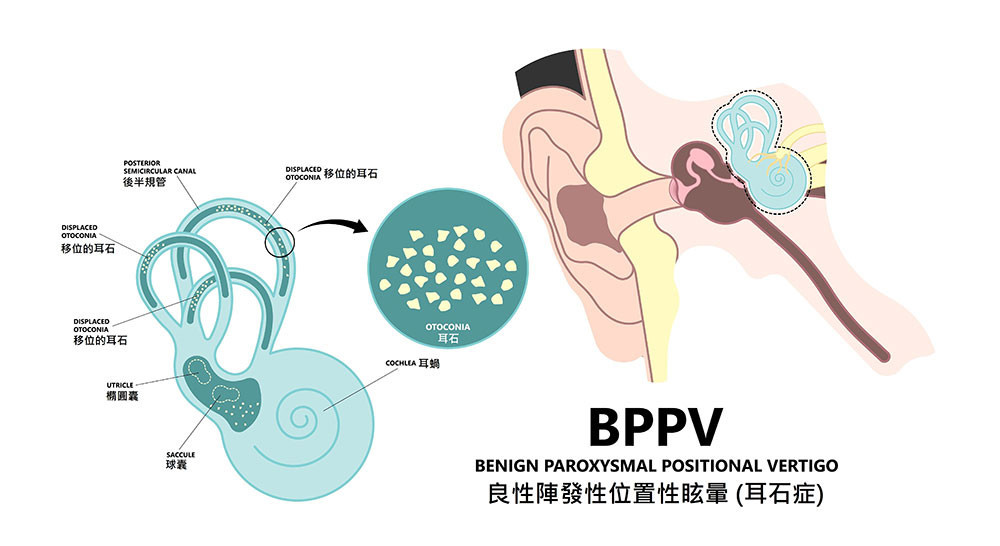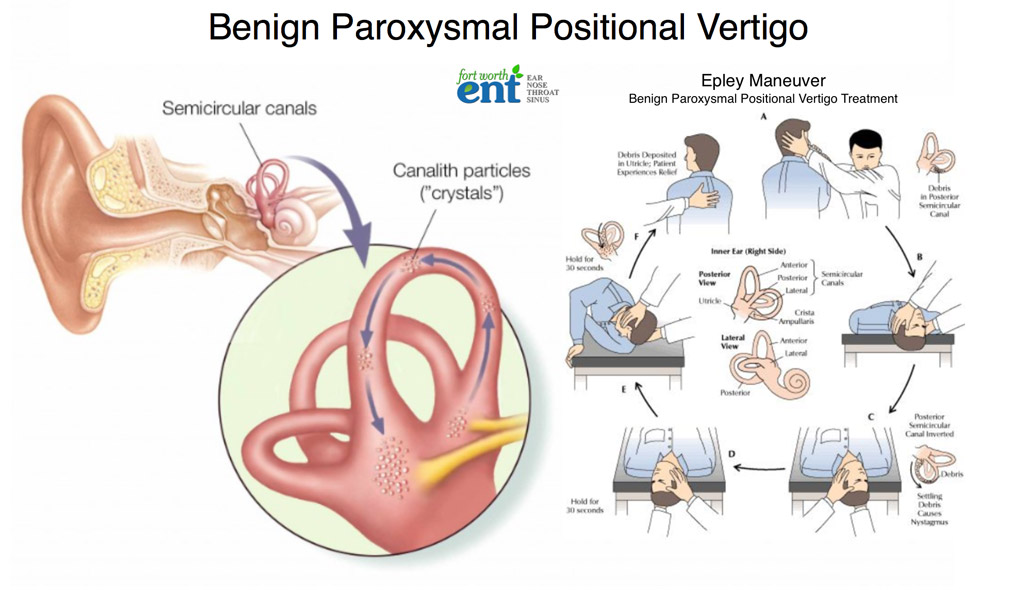Benign Paroxysmal Positional Vertigo (BPPV) Symptoms-various aspects-
Benign paroxysmal positional vertigo (BPPV) is defined by brief, sudden episodes of vertigo (spinning sensation) that occur with alterations in head position. Additional symptoms may encompass dizziness, lightheadedness, nausea, vomiting, and instability. Typically, these episodes persist for several seconds to minutes and are frequently initiated by actions such as turning over in bed or tilting the head.


Key Symptoms of BPPV:
- Vertigo: The experience of spinning or motion, either of oneself or the environment.
- Dizziness: A general sensation of lightheadedness or instability.
- Nausea: A feeling of sickness in the stomach.
- Vomiting: In certain instances, nausea may result in vomiting.
- Loss of Balance: Challenges in standing or walking, which can be accompanied by a sensation of nsteadiness.
- Rapid, Involuntary Eye Movements (Nystagmus): Typically observable during a doctor’s examination aimed at eliciting the vertigo.
- Triggers: Alterations in head position, particularly rolling over in bed, tilting the head, or bending forward.
If Any Patient of ENT Requires Any Surgery, Opd Consultation Or Online Consultation In Clinic of ENT Specialist Doctor Dr. Sagar Rajkuwar ,He May Contact Him At The Following Address-
Prabha ENT Clinic, Plot no 345,Saigram Colony, Opposite Indoline Furniture Ambad Link Road ,Ambad ,1 km From Pathardi Phata Nashik ,422010 ,Maharashtra, India-Dr. Sagar Rajkuwar (MS-ENT), Cell No- 7387590194, 9892596635
Brief
Benign paroxysmal positional vertigo (BPPV) ranks among the most frequent causes of vertigo — the abrupt feeling that you are spinning or that the interior of your head is rotating.
BPPV leads to short episodes of mild to severe dizziness. It is typically provoked by certain alterations in your head’s position. This may happen when you elevate or lower your head, when you lie down, or when you roll over or rise in bed.
Even though BPPV can be annoying, it is seldom serious unless it heightens the risk of falls. You can receive effective treatment for BPPV during a visit to a doctor’s office.
Symptoms
The indications and manifestations of benign paroxysmal positional vertigo (BPPV) may encompass:
- Dizziness
- A feeling that you or your environment are spinning or moving (vertigo)
- A lack of balance or unsteadiness
- Nausea
- Vomiting
The indications and manifestations of BPPV can fluctuate and typically last for less than one minute. Episodes of BPPV may vanish for a period and then return.
Activities that trigger the indications and manifestations of BPPV can differ from individual to individual, but are nearly always initiated by a shift in head position. Some individuals may also feel unstable when standing or walking.


Abnormal rhythmic eye motions typically accompany the indications of benign paroxysmal positional vertigo.
When to see a doctor
In general, consult your physician if you encounter any recurrent, sudden, intense, or prolonged and unexplained dizziness or vertigo.
Seek emergency care
Although it’s rare for dizziness to indicate a serious condition, consult your doctor right away if you experience dizziness or vertigo alongside any of the following:
- A new, different, or intense headache
- A fever
- Double vision or vision loss
- Hearing impairment
- Difficulty speaking
- Weakness in the legs or arms
- Loss of consciousness
- Falling or trouble walking
- Numbness or tingling
The indications and manifestations mentioned above may signify a more serious issue.
For Update On Further Important Health Related Topics And Frequently Asked Questions On Health Topics By General Population Please Click On The Link Given Below To Join Our WhatsApp Group –
https://chat.whatsapp.com/Lv3NbcguOBS5ow6X9DpMMA
Causes
Often, there is no identifiable reason for BPPV. This is referred to as idiopathic BPPV.
When a cause is identifiable, BPPV is frequently linked to a minor to severe impact to your head. Less frequent causes of BPPV include conditions that harm your inner ear or, infrequently, damage that arises during ear surgery or extended periods spent lying on your back, such as in a dentist’s chair. BPPV has also been linked to migraines.
The function of the ear
Within your ear is a small organ known as the vestibular labyrinth. It comprises three loop-shaped structures (semicircular canals) that hold fluid and delicate, hair-like sensors that track your head’s rotation.
Additional structures (otolith organs) within your ear observe your head’s movements — up and down, right and left, back and forth — and your head’s position in relation to gravity. These otolith organs contain crystals that heighten your sensitivity to gravity.
There are various reasons these crystals can become dislodged. When they do dislodge, they may shift into one of the semicircular canals — particularly when you are lying down. This results in the semicircular canal becoming responsive to changes in head position it would typically not react to, leading to the sensation of dizziness.
Risk factors
Benign paroxysmal positional vertigo is most commonly found in individuals aged 50 and above, but it can happen at any age. BPPV is also more prevalent in women compared to men. A head injury or another disorder affecting your ear’s balance organs may increase your risk for BPPV.
Complications
Though BPPV is unpleasant, it seldom leads to complications. The dizziness resulting from BPPV can cause you to feel unsteady, potentially increasing your risk of falling.


How do I know if my vertigo is BPPV?
To assess whether your vertigo is likely caused by Benign Paroxysmal Positional Vertigo (BPPV), observe for symptoms that are triggered by head movements, such as turning in bed or bending your head. BPPV commonly leads to a rapid onset of dizziness, a feeling of spinning or movement (vertigo), and could also be associated with nausea and vomiting. The dizziness typically lasts for several seconds to minutes and diminishes with head movements. BPPV is the most prevalent cause of vertigo and generally does not include hearing loss or tinnitus.
Key characteristics of BPPV:
- Vertigo triggered by specific head movements: Turning in bed, bending your head, or rising quickly can spark the dizziness.
- Sudden onset and short duration: The dizziness appears suddenly and generally lasts only a few seconds to minutes.
- No hearing loss or tinnitus: BPPV typically does not result in any auditory issues.
- Nausea or vomiting: These may occur in conjunction with the vertigo.
- Nystagmus: A physician may detect involuntary, fast eye movements during the examination.
Important: This information is intended for general guidance only and should not be regarded as a replacement for professional medical advice. If you are experiencing vertigo, it is vital to seek a medical assessment to identify the underlying cause. A physician may carry out the Dix-Hallpike test or other techniques to verify the diagnosis of BPPV.
Can I treat BPPV myself?
The home Epley maneuver is affordable and secure. It frequently proves effective in alleviating the symptoms of BPPV. Your healthcare provider might recommend the home Epley maneuver if your medical history and physical examination indicate that you have BPPV.
FOR INFORMATION IN GREAT DETAIL ON Benign Paroxysmal Positional Vertigo (BPPV) Treatment PL CLICK ON THE LINK GIVEN BELOW-It Is Always Better To View Links From Laptop/Desktop Rather Than Mobile Phone As They May Not Be Seen From Mobile Phone. ,In Case Of Technical Difficulties You Need To Copy Paste This Link In Google Search. In Case If You Are Viewing This Blog From Mobile Phone You Need To Click On The Three Dots On The Right Upper Corner Of Your Mobile Screen And ENABLE DESKTOP VERSION.
FOR INFORMATION IN GREAT DETAIL ON Ayurvedic Treatment For Vertigo PL CLICK ON THE LINK GIVEN BELOW-It Is Always Better To View Links From Laptop/Desktop Rather Than Mobile Phone As They May Not Be Seen From Mobile Phone. ,In Case Of Technical Difficulties You Need To Copy Paste This Link In Google Search. In Case If You Are Viewing This Blog From Mobile Phone You Need To Click On The Three Dots On The Right Upper Corner Of Your Mobile Screen And ENABLE DESKTOP VERSION.
If Any Patient of ENT Requires Any Surgery, Opd Consultation Or Online Consultation In Clinic of ENT Specialist Doctor Dr. Sagar Rajkuwar ,He May Contact Him At The Following Address-
Prabha ENT Clinic, Plot no 345,Saigram Colony, Opposite Indoline Furniture Ambad Link Road ,Ambad ,1 km From Pathardi Phata Nashik ,422010 ,Maharashtra, India-Dr. Sagar Rajkuwar (MS-ENT), Cell No- 7387590194, 9892596635
Issued In Public Interest By –
www.entspecialistinnashik.com



